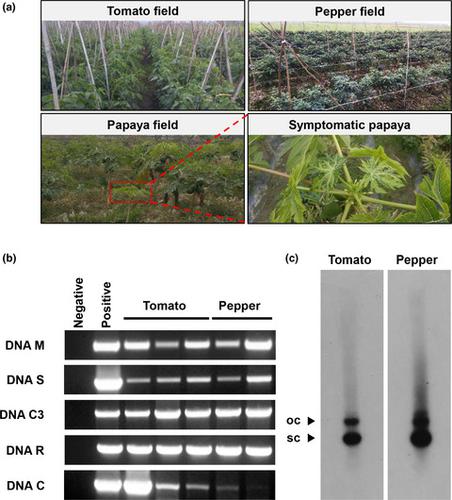当前位置:
X-MOL 学术
›
Plant Pathol.
›
论文详情
Our official English website, www.x-mol.net, welcomes your
feedback! (Note: you will need to create a separate account there.)
Milk vetch dwarf virus infection in the Solanaceae and Caricaceae families in Southeast Asia
Plant Pathology ( IF 2.3 ) Pub Date : 2020-05-05 , DOI: 10.1111/ppa.13196 Aamir Lal 1 , Eui‐Joon Kil 1, 2 , Vo T. B. Thuy 1 , Chairina Fadhila 1 , Phuong T. Ho 1 , Hee‐Seong Byun 1, 3 , Hang T. Dao 4 , Ji‐Kwang Kim 5 , Sukchan Lee 1
Plant Pathology ( IF 2.3 ) Pub Date : 2020-05-05 , DOI: 10.1111/ppa.13196 Aamir Lal 1 , Eui‐Joon Kil 1, 2 , Vo T. B. Thuy 1 , Chairina Fadhila 1 , Phuong T. Ho 1 , Hee‐Seong Byun 1, 3 , Hang T. Dao 4 , Ji‐Kwang Kim 5 , Sukchan Lee 1
Affiliation

|
Milk vetch dwarf virus (MDV) is an important member of the genus Nanovirus and is transmitted by the aphid Aphis craccivora. MDV has multiple single‐stranded DNA genome components, each approximately 1 kb, and two or three alpha‐satellite molecules. It mainly infects plants of the legume family Fabaceae. Recently, papaya (Carica papaya) collected in Yesan, South Korea, displaying symptoms of leaf yellowing and dwarfism, was identified as a new host for MDV. To examine the geographical distribution of MDV, papaya samples with symptoms were harvested in South Korea, Vietnam, and Taiwan in August 2018, along with tomato and pepper samples grown in adjacent fields in Vietnam. The results revealed the presence of MDV not only in papaya but also in pepper and tomato. This MDV infection in members of the Solanaceae family was confirmed by Southern blot hybridization performed using a PCR product of segment S as a probe. Based on sequence analysis of three MDV components (M, S, and C3), we verified the presence of three different isolates of MDV in these three countries and homology between sequences of isolates from papaya and from members of the Solanaceae from Vietnam. Taken together, our results clearly demonstrate MDV infection in Vietnam and Taiwan for the first time and confirm that MDV can infect economically important pepper and tomato.
更新日期:2020-05-05











































 京公网安备 11010802027423号
京公网安备 11010802027423号